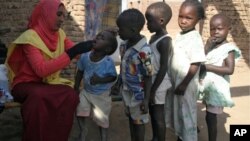South Sudan officials are hopeful the country will soon be declared polio-free, as the latest round of nationwide polio immunizations wraps up.
On the brink of being polio-free
Before 2008, the area that is now South Sudan, had been considered free of polio. That year the country was re-infected through an imported strain that originated in Nigeria.
In a country with only a 43 percent routine childhood immunization rate, there was widespread fear the highly infectious disease could spread. And it did. In six months after polio reappeared in South Sudan, 64 children were infected. All of them suffered at least partial paralysis.
But now South Sudan is on the brink of being declared polio-free, according to Dr. Abdi Aden Mohamed, the head of the World Health Organization in South Sudan.
“We are by now without a case for the last 32-plus months and hopefully, we will be able to say in four months South Sudan is polio free," he said. "We are very cautious in the sense of there are a number of countries surrounding South Sudan that cases might be here and there.”
Polio vaccinations, every child under six years
To make sure South Sudan reaches its goal the government, in collaboration with the United Nations, is wrapping up its latest door-to-door campaign. Volunteers across the country have tried to immunize every child under six years against polio. To date, more than 3.2 million South Sudanese children have been immunized.
The latest round of door-to-door immunizations this month is the country’s 24th since polio reappeared.
The organizers have learned not to leave anything to chance in their effort to reach every child. They put out a blitz of radio announcements and billboards weeks ahead of this campaign. Trucks with speakers attached rolled through almost every community to announce the dates of the campaign.
UNICEF communication for development officer Mercy Kolok says the goal was to make sure all parents felt compelled to get their children vaccinated. “Since we started the campaigns, the perception of immunization has changed and mothers are now demanding for immunization services ... We are happy that the caregivers are now able to demand, unlike before where we have to convince them to take the vaccine.”
Kolok says she hopes the interest in the polio vaccine eventually translates into more mothers taking their children to health centers, where they can get all of their childhood immunizations.
It worked with Jane Yangi. She did not want to wait for the volunteers to come to her house. She showed up at the Munuki Health Center where volunteers were gathering, to have her five-month-old daughter Gloria Guna vaccinated. “I have to bring her for vaccination today. It is important," she said. "It makes her safe from disease.”
Delivering the vaccine takes less than a minute, requiring just two drops in a child’s mouth. Volunteers mark the child’s finger with ink and then move onto the next patient.
Though the procedure is simple, this vaccination round required coordinating 20,000 volunteers. They have to be registered, trained and transported to communities throughout the country.
Volunteers make an impact
Alfred Lupai served as a team leader for two of the groups working in Juba. He said the volunteers, most of whom are teenagers, show up because they understand the impact of the work they are doing on the future of the country. “You are helping your own blood and your own brother to save people," he said. "Sometimes different tribes, but they are welcoming. The moment you reach their home, they welcome you.”
If the effort is successful and no new cases emerge in South Sudan, the country will be officially polio-free in a matter of months. But the immunization campaign will not be ending. With polio present in the surrounding region, South Sudan will have to stay vigilant or risk another re-emergence.
This story was reported for VOA in collaboration with the International Reporting Project.




